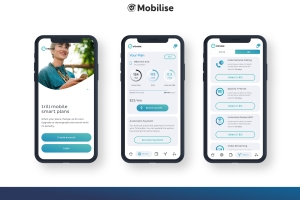In response to growing demand for digital services from service providers (SPs) and their customers alike, telecom software provider and eSIM as a Service provider, Mobilise, has launched its eSIM software development kit SDK. The SDK allows SPs to offer global connectivity to customers from within their existing application, including an in-app eSIM activation capability.
Supporting both iOS and Android applications, SDK allows SPs to offer connectivity services via their existing app in an instant, including 4G data connectivity and automatic Access Point Name (APN) settings, with 5G connectivity in development for launch. The kit also features account management tools that give customers full transparency and control of their mobile subscription, with instant visibility of bundle usage, payment and auto-renewal features.
There’s no customisation required SDK grants SPs access to APIs that support on-device telephony service management, authentication and provisioning, enabling a plug and play solution, reducing the integration effort from months to days. The SDK comes with ongoing support and development from Mobilise’s team of telecoms and software experts, whenever required.
One of SDK’s flagship modules is for eSIM, which allows SPs to launch an in-app eSIM activation capability without the overhead of eSIM integration. Many existing eSIM solutions require QR code activation. While these solutions work, they are clunky and require customers to have two devices available to activate their SIM profile. Opting for in-app activation offers a great and seamless customer experience (CX).
Delivering a digital-first CX has never been more crucial. EY’s report Digital transformation for 2020 and beyond revealed that the three strategic focus areas that most telecoms players were prioritising that year were digital business models, customer experience, and control of cost and business efficiencies.
However, implementing new technology to ensure focus remains on these areas is challenging. With SDK, the headache of development, maintenance and compliance is taken care of, and SPs are able to channel their efforts into ensuring a positive impact from digitalisation, rather than just trying to ensure successful implementation.
“While consumer eSIM technology has been around for a while, it’s recently gained more traction, thanks to announcements like Apple‘s decision to make the new iPhone 14 eSIM only in the US,” explained Hamish White, CEO of Mobilise. “As such, SPs are left with no choice but to add eSIM capabilities to their roster if they’re to keep up with the digital switchover. With SDK, SPs can integrate eSIM capabilities into their existing application instantly.
“SDK isn’t just suitable for telecoms SPs in the original sense, however. There’s also scope for use cases across finance, where SPs can embed connectivity within an existing app to enable their customers to access financial services at any time from anywhere, and in the travel sector, where it enables companies to offer data bundles as part of their core service package to keep customers connected wherever they go.
“Regardless of the industry, customers and their expectations are getting more and more demanding, and challenging, to meet. SDK’s modular architecture and ability to drop new features into existing apps allows SPs to add new service offerings simply and quickly, constantly improving CX without the lengthy and costly challenge of developing new features in house.”
For more information on Mobilise’s SDK and its global connectivity, account management and eSIM features, get in touch with the member of the team today by visiting the website.
The author is Hamish White, CEO of Mobilise.
Comment on this article below or via Twitter: @VanillaPlus OR @jcvplus”






